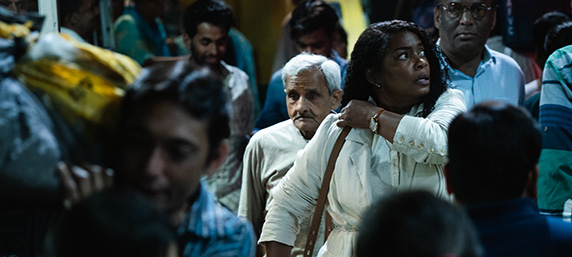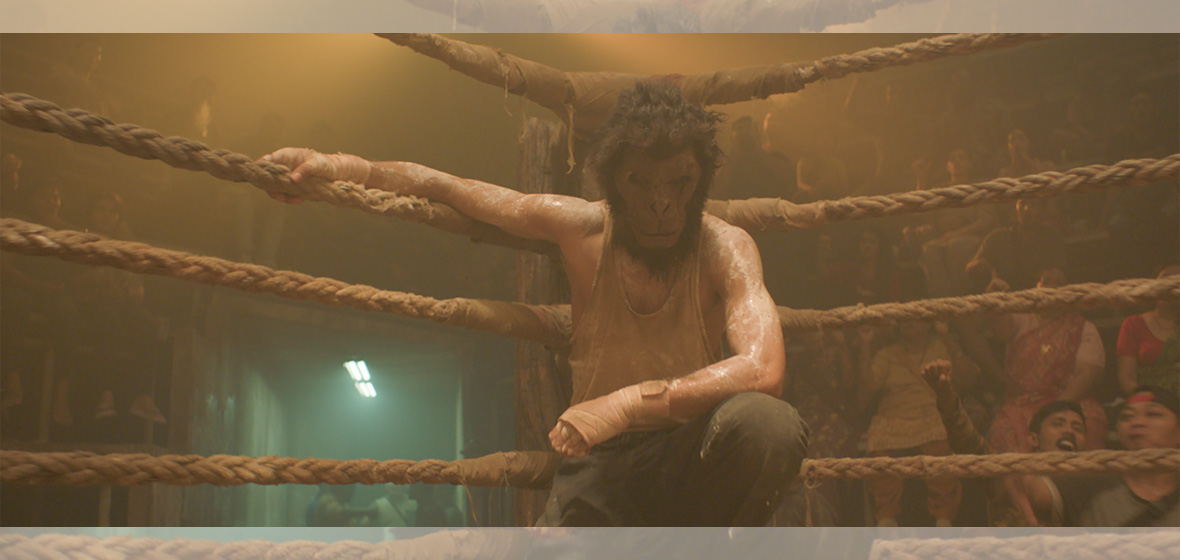Monkey Man
Legend goes that Dev Patel, too eager to star in his own John Wick-like action franchise, got tired of waiting to be cast and decided to go to work and write, produce and direct his own film, inspired by Hindu folklore and set in the bustling streets of Mumbai. Rumour also has it the film was set for a streaming-only release until Jordan Peele caught a screening of it and decided audiences should have the chance to watch it on the big screen. So he approached Universal to buy it off Netflix to guarantee a theatrical release.
If legends are absolute, that’s pretty much the most significant endorsement the film could get – a balls-to-the-wall passion project that hits so hard that the director of Get Out and Nope forced his producers to spend millions just so everyone could watch it in a cinema.
From the first scene, you get the excitement. The camera lingers in close-ups; it moves frenetically from one subject to another, barely having time to refocus. It’s intense and dizzying. The film reminds us how a fight works- all on instinct. There’s no time to think of repercussions or assess the information. You hit ’em on the head. Make ’em bleed.
Monkey Man starts with the unnamed titular character; the credits call him only Kid, played by Patel, fighting his opponent on an illegal fighting ring run by a sadistic South African (Sharlto Copley). The kid loses the fight but only receives half the money; there’s more if he bleeds. He needs the money to complete a plan to infiltrate a mysterious underground club attended by the rich, the famous, and the scoundrels. He goes from washing dishes in the kitchen to serving champagne to the VIPs entertained by prostitutes.
His plan is slowly revealed through flashbacks. Something happened to his mother; someone high up in Indian society is responsible. Since he was a child, he has worked to find the person and slowly get close to them and kill them.
It’s a tale as old as time – man on a vengeance path. But Patel uses it as a canvas to externalise two itches he is dying to scratch. The first is to make an excellent old-school action flick, which he does with gusto. It’s easy to compare Monkey Man with John Wick; a scene alludes to this is when Ams’s dealer tries to sell him the same gun Keanu uses in the film. That Patel chooses another – slower, not as slick, more old school – explains how he sees his approach.
Patel isn’t trying to do John Wick. He’s trying to do Only God Forgives if directed by John Woo and choreographed by Tony Jaa. His Monkey Man isn’t a great fighter; he gets hurt easily and isn’t the most intelligent person. But he’s willing to learn and get better. It’s that simplified videogame logic. Woo was terrific at it; it turns these protagonists into honest people who have yet to achieve their mythological status.
The other itch is to make a real Indian story using a genre with broad universal appeal. As the narration at the start says, the story is based on the Hindu legend of Hanuman – a monkey deity with an insatiable appetite until the day he tried to eat the sun, confusing for a mango. As legends do, the legend adds some, if tenuous, depth to the plot, and he complements it with an interpretation of modern India. A country haunted by the effects of colonialism and a rising, ultra-nationalistic political figure supported by a zealous religious leader, accentuating the threat to many minorities.
It’s perhaps shoe-horned, but I can’t fault him for indulging in his urge to add as much as possible about a reality he understands, whether people want it or not.
The reason why Monkey Man works is because of the spectacle. At the end of the day, the background and setting are interesting and curious details, but the show Patels puts on gets the blood pumping. It’s interesting how you can see his inexperience as an action director – his shots are beautiful and inventive, but it still lacks the finesse of an experienced filmmaker. But is that really a problem? Monkey Man remains a brutal, bloody, exciting affair, made with so much pizzazz it could only come from the mind of a madman. And the best kind of film comes from there.
Verdict: 4 out of 5
For fans of old-school bloody action flicks. Monkey Man presses the right buttons before smashing the whole console in our faces.

Origin
I have a lot of respect for Ava DuVernay. She’s the kind of filmmaker whose tone matters above everything else. She’s a social justice warrior to whom the plight of African Americans stands too close to her heart. I loved her measured Selma, but I was angered by her terrific documentary The 13th. I even defended her maligned adaption of Madeleine L’engle’s A Wrinkle In Time, the answer to the question, “What if Terrence Malick made a children’s movie?”
I like Ava DuVernay. That’s why I don’t know what happened here.
Origin is a curious idea. It is not an adaption of Isabel Wilkerson’s book Caste: The Origin of Our Discontents but an attempt to re-enact how the book was written and, in the process, explain the broad strokes behind its idea.
Wilkerson is played by Aunjanue Ellis-Taylor. Reeling from the success of her previous book, she’s trying to find the right topic for her follow-up when three critical things happen. First was the death of Trayvon Martin, then the sudden passing of Wilkerson’s husband, Brett (Jon Bernthal) and finally, of her mother, Ruby (Emily Yancy). Amid her grief, Wilkerson found herself thinking more about her culture, her place as a successful African-American woman, of the Trayvon Martins of this world, and how that connects to the holocaust and the Indian caste system.
Wilkerson goes on a globetrotting campaign to find out why human racists are what they are. That’s a very reductive way of seeing it, but in my defence, the film’s perspective is very reductive. Part of it comes from the idea working only in Wilkerson’s head. She spends most of the film trying to convince everyone that there is something in her idea, and it’s not just the rambling of a talented writer in grief. There’s a lot of Wilkerson talking to people, hearing their concerns, and then reasoning why she’s on the right track.
This is complemented by three stories set in the past. One set during Jim Crow when four University students (two white, two African Americans) went “undercover” in a small town to witness how upfront institutionalised racism was; the second during the holocaust following a mixed couple witnessing the rice of Jewish persecution; and finally the story of Dr Bhimrao Ambedkar, a Dalit academic who fought for human rights and contributed to writing the Constitution of India.
All this converges in the third act, where DuVernay heroically shoots Wilkerson, writing the book as she prepares to move home. It’s impressive how epic it is to see a person frantically writing on a whiteboard intercut with the climax of all the previous stories, with Wilkerson narrating the eight principal points of her thesis in five minutes, and what she does in 500 pages.
The result is deflating. It has the energy and gravitas of a Ted Talk, made for an audience to leave the cinema pretending to be experts about a theme for the minimum effort.
Is Wilkerson’s idea correct? It’s complex and deserves to be studied and scrutinised like all good theses. What it doesn’t deserve is a reductive summary. A brief Wikipedia page. A book of annotations removed of context.
Verdict: 1.5 out of 5
See it for Ellis-Taylor. The idea of the film may fail, but she holds it together with intense grit. About time she gets her deserved time in the mainstream.




